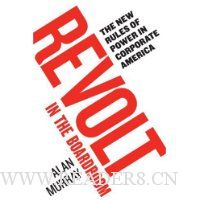
基本信息出版社:HarperBusiness
页码:272 页
出版日期:2007年05月
ISBN:0060882476
International Standard Book Number:0060882476
条形码:9780060882471
EAN:9780060882471
版本:1
装帧:精装
正文语种:英语
外文书名:董事会议室里的反叛
内容简介
Throughout the 20th century, American corporations were governed by autocratic, almost unaccountable chief executives. Their word was law and the only check on their power was a board of directors composed of their friends and allies.
Then, in a stunning reversal, a momentous series of firings deposed the heads of some of the world's best-known companies: AIG, Morgan Stanley, Boeing, Hewlett-Packard and Pfizer, just to name a few. Formerly unchallenged CEOs found themselves under fire, often from their own handpicked boards. The number of deposed executives is astonishing. In 2004, the leaders of 600 companies were asked to leave. That number more than doubled in 2005 and reached 1,400 companies in 2006.
Flexing new muscles, directors are assuming new and unfamiliar responsibilities. In Revolt in the Boardroom, Alan Murray reveals the inner workings of the new seat of power. Using the access afforded to him by his influential Wall Street Journal column, Murray tells the story of three seminal board revolts—the now-famous Hewlett-Packard drama, the ousting of Boeing's Harry Stonecipher and the end of the reign one of the world's most autocratic executives, Hank Greenberg at AIG.
Murray goes further to chart the history of the corporation, the rise of governance and the effects of the new power gained by outside institutions like hedge funds and interest groups. Through it all, Murray shows how the job of chief executive has rapidly and permanently changed. Leaders like A. G. Lafley and Jeff Immelt govern instead of rule, build alliances and support instead of dictating direction and pay careful attention to a broader range of stakeholders than ever before.
Revolt in the Boardroom is the first look at the new world of corporate power and the last word on the transformational events of the last two years.
作者简介
Alan Murray is executive editor, online, for the Wall Street Journal, and has editorial responsibility for WSJ.com, MarketWatch, and the Wall Street Journal's books, television, and conference businesses. He is the author of Showdown at Gucci Gulch and The Wealth of Choices.
媒体推荐 "A research-rich, well-reasoned analysis of the forces that swirled together...to shake the thrones of U.S. corporate empires." -- Philadelphia Inquirer
"Discovers fresh insights from even the best-known corporate blow-ups." -- BusinessWeek
"Draw[s] insight from even the best-known corporate blow-ups." -- BusinessWeek
"[Murray] takes us inside the boardrooms of companies such as GM, Enron, and WorldCom during periods of crisis." -- Booklist
Murray is the assistant managing editor of the Wall Street Journal and has written two books covering investing and the relationship between corporations and politics. Here he examines how CEOs, once the rock stars of the 1990s, are now being put under the microscope by board members, shareholders, the government, and even underling employees. In the last several years, powerful CEOs have been forced out for poor performance or improprieties, something almost unheard of in the past. According to Murray, public corporations are in the midst of radical change due to governmental oversight and high demands from shareholders and the public, and the role of the CEO may be greatly diminished as a result. He takes us inside the boardrooms of companies such as GM, Enron, and WorldCom during periods of crisis and shows how the scandals and corruption of the recent past have created a sense of paranoia and a zero-tolerance atmosphere. Although many may applaud this new shift of power, Murray explores how the ramifications of governance by committee may have drawbacks of its own. --David Siegfried -- Booklist
Murray provides a useful history of the corporation and its role in the USA?s commercial dominance of the 20th century. -- USA Today
专业书评 From Booklist
Murray is the assistant managing editor of the Wall Street Journal and has written two books covering investing and the relationship between corporations and politics. Here he examines how CEOs, once the rock stars of the 1990s, are now being put under the microscope by board members, shareholders, the government, and even underling employees. In the last several years, powerful CEOs have been forced out for poor performance or improprieties, something almost unheard of in the past. According to Murray, public corporations are in the midst of radical change due to governmental oversight and high demands from shareholders and the public, and the role of the CEO may be greatly diminished as a result. He takes us inside the boardrooms of companies such as GM, Enron, and WorldCom during periods of crisis and shows how the scandals and corruption of the recent past have created a sense of paranoia and a zero-tolerance atmosphere. Although many may applaud this new shift of power, Murray explores how the ramifications of governance by committee may have drawbacks of its own. David Siegfried
Copyright © American Library Association. All rights reserved